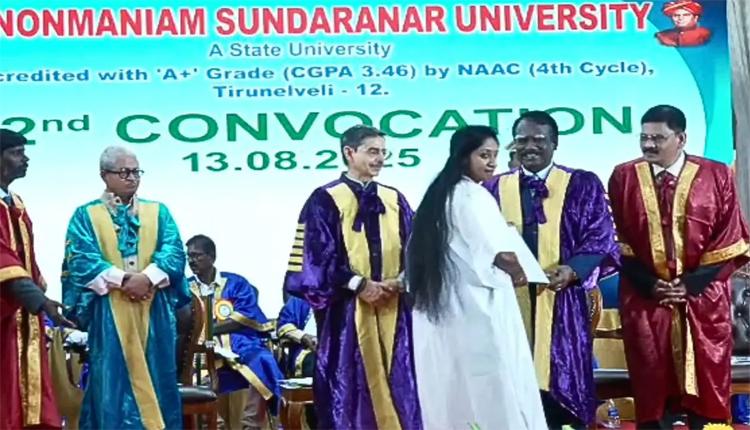Chennai: A convocation ceremony at Manonmaniam Sundaranar University (MSU) turned into a political flashpoint when PhD scholar Jean Joseph refused to accept her degree from Tamil Nadu Governor R N Ravi. Instead, she walked past the Governor, who is also the university’s chancellor, to receive her certificate from Vice-Chancellor M Chandrasekar. Her act, rooted in her belief that Ravi has worked against Tamil Nadu’s interests, has set social media abuzz and reignited debates about the governor’s role in the state. With a video of the incident going viral, this quiet protest is anything but silent in its impact.
A Stand For Tamil Identity
Jean Joseph, a scholar in microfinance, didn’t hold back when explaining her decision. “I believe the Governor has done nothing for Tamil Nadu or the Tamil language,” she told reporters, her voice steady but firm. “He’s against our land, our culture, and our people.” Joseph, whose husband, M Rajan, is the DMK’s Nagercoil deputy secretary, said her protest was about principle, not personal grudges. “I believe in the Dravidian model of governance,” she added, pointing to leaders like Chief Minister M K Stalin or the Education Minister as more fitting to confer degrees. “Students should have the choice to decide who hands them their hard-earned certificates.”
The moment was striking. As Ravi, smiling, gestured for Joseph to stand beside him for the customary photo, she ignored him, took her degree from Chandrasekar, and said a pointed “Thank you.” Ravi nodded in response, but the snub was unmistakable. Social media erupted, with posts on X praising Joseph’s courage, while others questioned the politicisation of an academic event.
A Ceremony Under Scrutiny
The 32nd convocation at MSU’s V.O.C. Auditorium was a grand affair, with degrees awarded to 37,376 students from 104 affiliated colleges, including 759 who attended in person, among them 650 PhD scholars. The event, graced by A P Dimri, Director of the Indian Institute of Geomagnetism, was meant to celebrate academic achievement. Instead, Joseph’s act stole the spotlight, turning a routine ceremony into a stage for political expression.
Her academic journey is notable. After earning a B.Com from Hindu College in Nagercoil and an MBA from Mepco College in Sivakasi, Joseph completed her PhD in microfinance at MSU. Her research focuses on empowering communities through financial inclusion — a fitting backdrop to her bold stand for Tamil identity.
The Governor’s Rocky Tenure
RN Ravi, a retired IPS officer appointed governor in 2021, is no stranger to controversy. His tenure has been marked by repeated clashes with the DMK-led state government. In 2023, he returned 10 of 12 bills passed by the state assembly, including those curbing his powers over university appointments, and sent two to the President. The Supreme Court, in a landmark April 2025 ruling, called his actions “illegal and unconstitutional”, stating governors must act on the council of ministers’ advice.
Ravi’s actions have fuelled accusations of pushing a “Hindutva agenda”. His chanting of “Jai Shri Ram” at a 2021 event and comments questioning Tamil Nadu’s educational standards have only deepened the rift. At a recent Chennai Citizens Forum event, he claimed many of the state’s PhD holders lack adequate skills, drawing sharp criticism from academics and the DMK.
Political Reactions And A Broader Debate
The BJP was quick to hit back. State president K. Annamalai called Joseph’s protest a “deplorable drama” staged for political mileage, urging CM Stalin to keep politics out of academia. But Joseph’s supporters, including fellow students, see it differently. “If it was wrong, why did so many congratulate me?” she asked, noting the applause she received. Her act has sparked a larger conversation about student autonomy and whether convocation traditions should bend to personal or political convictions.
The DMK’s strained relationship with Ravi adds fuel to the fire. The party, rooted in Dravidian ideology, has long accused the governor of undermining Tamil Nadu’s interests. Joseph’s protest, tied to her husband’s DMK role, has been framed by some as a party-orchestrated move, though she insists it was her own decision. On X, sentiments are split— some hail her as a champion of Tamil pride, while others call it an unnecessary spectacle.
Joseph’s refusal isn’t just a personal stand; it’s a symbol of Tamil Nadu’s fraught political landscape, where regional identity and state-central tensions collide. Her act challenges the ceremonial role of governors and raises questions about who represents academic achievement. Should students have a say in who hands them their degrees? And can academic spaces remain apolitical in a state where culture and politics are so intertwined?



Comments are closed.